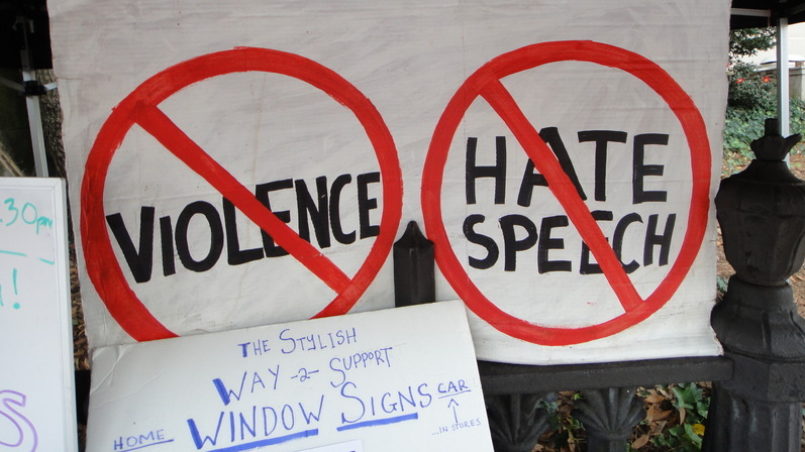Hate Posts and Fake News from the Perspective of the Judiciary

Event data
- Datum
- 22. 6. 2017
- Host
- IT-LAW.AT (Interessensgemeinschaft) und Universitätslehrgang für Informations- und Medienrecht
- Location
- Juridicum, Rechtswissenschaftliche Fakultät der Universität Wien
- Event-type
- Vortrag
- Participants
- Maria Windhager, Rechtsanwältin
- Albert Steinhauser, Sprecher für Justiz, Demokratie & Verfassung, Datenschutz & Netzpolitik der Grünen
- Nikolaus Pitkowitz, Rechtsanwalt
- Christian Pilnacek, ustizministerium, Leiter der Sektion Strafrecht
- Albrecht Haller, Rechtsanwalt
On Thursday, 22nd June 2017, there was a talk on hate posts and fake news and how to deal with them from a legal perspective at the Law Faculty of the University of Vienna.
The following reported on the legal aspects: Albrecht Haller and Maria Windhager, who run their own law office specialising in IT and media law, Christian Pilnacek, Head of the Criminal Law Department at the Ministry of Justice, Nikolaus Pitkowitz, partner in the law office, Graf & Pitkowitz, as well as Albert Steinhauser, Speaker for Justice, Democracy and the Constitution, Data Protection and Network Policy of the Greens.
To begin, Albrecht Haller provided a brief overview of the relevant paragraphs in the Austrian legislation:
According to paragraph 283 of the Criminal Code, not every racist statement in the internt is automatically a hate post; despite this many personal posts would fulfill the legal crime of incitement.
The prerequisite has to be that the inciting statement has been made publicly i.e. in front of at least 30 people. This already affects smaller online forums or Facebook groups.
Included are also contemptuous or disparaging insults from religious or ethnic groups. Anyone who publicly denies or belittles legally established genocide or war crimes is also liable to prosecution.
Even if an individual does not himself/herself produce the inciting content but deliberately and approvingly spreads it, he/she could be prosecuted. This concerns, for example, the sharing of contributions in social networks such as Facebook or Twitter.
In any case, the countries in Europe have now become more attentive to the internet as the extent of attention and influence in social networks has increased greatly. Some “older” paragraphs, such as the right of reply, which is relevant in the case of false assertions, could be applied.
After this opening, Maria Windhager spoke. She was the responsible lawyer when the Greens sued Facebook. This case concerned greatly inciting hate posts on Facebook directed against Eva Glawisching, the former party leader of the Greens.
It was a partial success. The Oberlandesgericht (Higher Regional Court) in Vienna ordered all identical posts to be deleted but there was no decision as to whether a host provider, i.e. Facebook, should also look for similar content and remove them from the web. This decision has to be made by the Supreme Court. Here the case was brought by reference to the personality protection right.
An interim injuction has been submitted to the Commercial Court. Facebook’s appeal was rejected by the Higher Regional Court in Vienna. In the course of the proceedings, two questions of principle were clarified: the application of Austrian law and the obligation to theoretically delete hate postings worldwide.
Until now, Facebook had maintained that it could only be sued in California or at most, in Ireland where the European headquarters are located.
The statements about Glawischnig unequivocally violated the “Community Standards” and as such the presentation from the perspective of the company was rejected. This was the first case in which an interim injunction against Facebook was issued in Austria in a higher instance.
Maria Windhager ended her talk with this report from practice and Nikolaus Pitkowitz presented the basic individual rights which could be affected in legal practice.
According to the E-Commerce Law in Austria, a large provider should not be liable for content to the extent that it introduces counter-measures. Large providers also have no surveilling obligation, only the user is liable. There are indeed advantages, such as the fact that the crimes of the American law enforcement officers could be solved because images of the assaults were posted on the web, but it is unclear whether or not one would be liable to prosecution in this sense for incitement.
With this statement, Nikolaus Pitkowitz turned to Albert Steinhauser, who explained that there are great differences between hate postings and fake news.
On the one hand, each issue has, in principle, different jurisprudence and, on the other, hate posts in particular are often more misogynist than fake news. He named as an example the attacks against the author, Stefanie Sargnagel who was ostracised by the Austrian newspaper, the Kronen Zeitung, for her exaggerated presentation of her trip to Morocco which was partially funded by public money.
30 years ago, campaigns to incite were still much more difficult because this was only possible by means of flyers or public broadcasts. One could do something by means of the instrument of violation of a legally protected right but implicit threats were difficult to sue. A distinction is made between whether the reason for the incitement was the fact that one belonged to a particular group or because of one’s gender.
Christian Pilnacek, Head of the Criminal Law Department at the Ministry of Justice, then spoke about the new procedures within the framework of digitalisation. Initially, the European Court of Justice published a fact-finding paper on the subject of hate posts and incitement. And Germany has also introduced the controversial Netzwerkdurchsetzungsgesetz (“Act on Law Enforcement in the internet”), which has already met with opposition from civil rights organisations.
The Head of the Criminal Law Department ended at this point, marking the end of the event.
Credits
| Image | Title | Author | License |
|---|---|---|---|
 |
No violence no hate speech | John S. Quarterman | CC BY 2.0 |
